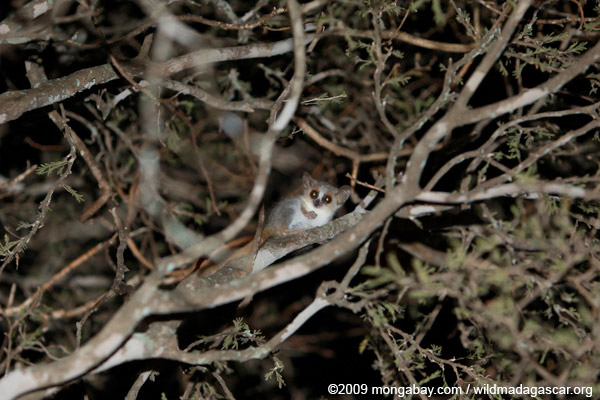
Gray mouse lemur in Madagascar. Photo by: Rhett A. Butler.
As a small-brained and largely solitary primate, the gray mouse lemur (Microcebus murinus) wasn’t supposed to have the capacity to distinguish the calls of its kin calls from other lemurs. However, a new open-access study in BMC Ecology, finds that a female gray mouse lemur is able to determine the mating calls of its father, allowing it avoid inbreeding. The discovery challenges the long-held belief that only large-brained, highly social animal are capable of determining kin from calls.
“This suggests that the mechanisms for kin recognition like those seen here may be the foundation from which more complex forms of kin-based sociality evolved,” Sharon Kessler, lead author of the study, said in a press release. The discovery adds weight to the idea that social and intelligent primates may have evolved from solitary foragers like the gray mouse lemur.
As they forage at night, gray mouse lemurs were found to frequently make two types of calls: mating calls and alarms. By analyzing the calls, the researchers found that mating calls given by the males contained parental signatures, i.e. allowing female daughter to ignore these calls, whiel such signatures were absent in alarm calls.
The gray mouse lemur is the largest of the ‘mouse lemurs,’ which include the world’s tiniest primates. The species is listed as Least Concern by the IUCN Red List, making gray mouse lemurs one of the only lemurs not threatened with extinction; a recent assessment found that over 90 percent of the world’s lemurs are imperiled. All lemurs are found on the island of Madagascar.

Gray mouse lemur. Photo by: Rhett A. Butler.
CITATION: Sharon E Kessler, Marina Scheumann, Leanne T Nash and Elke Zimmermann. Paternal kin recognition in the high frequency ultrasonic range in a solitary foraging mammal. BMC Ecology. 2012.
Related articles
Greater bamboo lemur removed from ‘most endangered primates’ list
(11/13/2012) Madagascar’s greater bamboo lemur has been removed from the list of the world’s 25 most endangered primates after conservationists discovered previously unknown populations of the rare creature, according to the Aspinall Foundation, a charity that set in motion a species survival plan for the lemur.
Madagascar gets biggest protected area

(08/17/2012) Madagascar officially designated its largest protected area in a region renowned for its tropical rainforests and rich diversity of wildlife, including 20 species of lemurs, reports the Wildlife Conservation Society (WCS), a group that was instrumental in establishing the park. Makira Natural Park covers some 372,470 hectares of forest in northeastern Madagascar, the most biodiverse part of the island nation.
Past climate change reduced lemur population in Madagascar
(07/24/2012) Climate change that took place 4,000-10,000 years ago may have contributed to the endangered status of one of Madagascar’s rarest lemurs by reducing the extent of its habitat, argues a new study published in the journal Proceedings of the Natural Academy of Sciences.
91% of Madagascar’s lemurs threatened with extinction

(07/13/2012) 94 of the world’s 103 lemur species are at risk of extinction according to a new assessment by the International Union for Conservation of Nature (IUCN) released by the group’s Species Survival Commission during a workshop this week. Lemurs, a group of primates that is endemic to the island of Madagascar, are threatened by habitat destruction and poaching for the bushmeat trade.
Cutting-edge research center opens in Madagascar rainforest

(07/03/2012) A high-tech research center opened today on the edge of a rainforest in Madagascar. The facility, known as the Centre Valbio, will support efforts to study Madagascar’s unique wildlife, deliver health care to impoverished communities, and understand links between the environment and the rural economy. The project was led by Patricia Wright, a Stony Brook University biologist whose 1986 discovery of the golden bamboo lemur led to the protection of a large swathe of rainforest known as Ranomafana.







